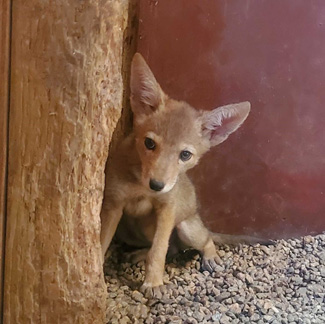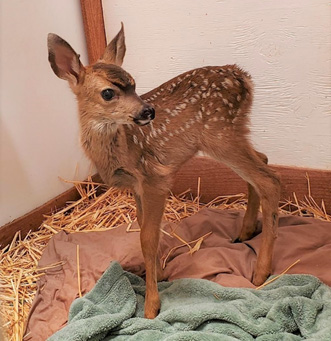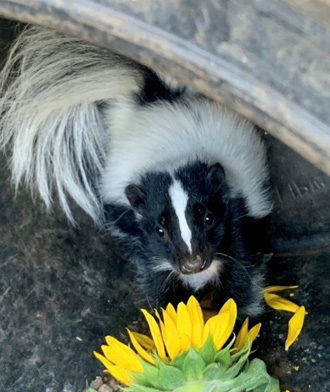Are You My Mother? When to Intervene
By Jenn Guess, Hospital Manager
Encountering a young animal in the wild can be an exhilarating experience. Although it is natural to have the initial instinct to intervene in an attempt to protect the animal, stepping in without proper knowledge can do more harm than good. In many cases, baby mammals are left alone temporarily while their parents forage for food and disturbing them can lead to unnecessary separation from their family unit. Here at CWC we receive many calls about “orphaned” coyotes, deer, and skunks. Below you will find information to help you determine if human intervention is needed.
Coyotes – Baby coyotes, called pups, are born blind and helpless. They typically stay in the den for the first few weeks of life, relying on their mother for warmth, protection, and sustenance. As they grow, they start to venture out of the den to play and to explore their surroundings under their parents’ watchful eye. Pups should never be seen alone in the wild. If you come across a single coyote pup, help is often needed. Since coyotes can potentially host the rabies virus, never attempt to contain or interact with them in any way. Instead, contact your local wildlife rehabilitation facility or animal control for assistance.
Deer – Shortly after being born baby Mule Deer, called fawns, are licked clean by their mother and moved to a safer location. Fawns are precocial animals, meaning they are born with their eyes open and can stand independently. At this point the mother will come by only a few times a day to feed her young. For the first week of life the only defense mechanism for a fawn is to hide, and mother deer do their best to not draw attention to their vulnerable offspring. If you see a fawn curled up in the grass, there is a good chance that their mother is close by. If the animal is bright-eyed and alert, leave the area. The mother will not come back to care for her young if people are lingering around.
Skunks – Baby skunks, called kits, are a rabies vector species and so it is important that members of the public do not touch or interact with them. After kits are born, they are entirely dependent on their mother until they are about six to eight weeks old. Eventually the young skunks will start to follow their mother and learn how to forage. If you see a baby skunk, wait a few minutes to see if the mother appears or if the skunk returns to the den. If the young animal is alone for an extended period, it is likely that they need help.
Many times, it can be very difficult to tell if a young animal is truly orphaned, or if solitude is part of the natural evolution of their species. Contact a trained professional if you ever have concerns about a wild animal. Although we rehabilitators are able to satisfy the developmental needs of young wildlife, it is a job best left for the animal’s true parent.

Coyote Pup

Mule Deer Fawn

Striped Skunk Kit
